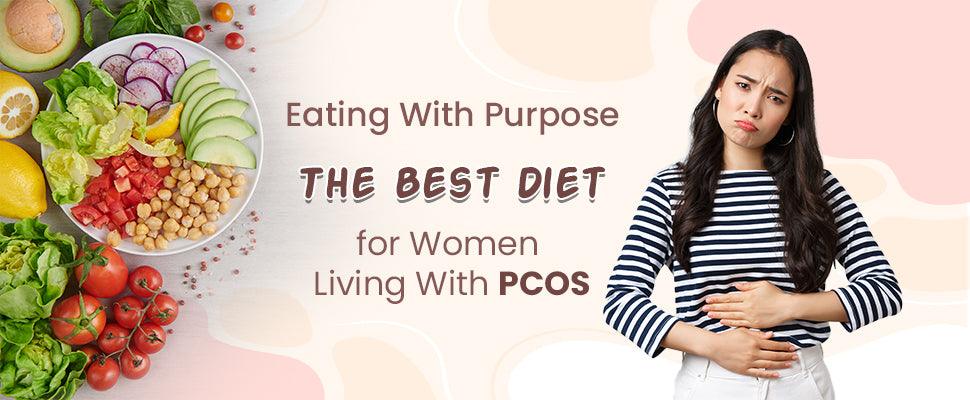Did you know that Polycystic Ovary Syndrome (PCOS) affects up to 10% of women of childbearing age worldwide? Managing PCOS symptoms can be challenging, but one of the most effective ways to take control is through diet. The right diet can help regulate hormones, manage insulin levels, and alleviate the symptoms of PCOS.
In this blog, we’ll explore the best PCOS diet, offering insights into foods that can help and those you should avoid. By making informed dietary choices, you can improve your quality of life and manage PCOS more effectively.
Understanding PCOS and Its Symptoms
PCOS, or Polycystic Ovary Syndrome, is a hormonal disorder that affects women of reproductive age. Women with PCOS may experience a range of symptoms, including irregular periods, weight gain, acne, excessive hair growth, and infertility.
The exact cause of PCOS is unknown, but it is often linked to insulin resistance, inflammation, and hormonal imbalances.
Given that diet plays a crucial role in managing insulin levels and inflammation, adopting a PCOS diet is a powerful tool for managing symptoms and improving overall health.The Best Diet for PCOS: What to Eat
Adopting the right diet can make a significant difference in managing PCOS symptoms. Here’s a detailed look at what your diet should include:
1. Millets
Millets like bajra, jowar, and ragi are excellent grains to include in your PCOS diet. These grains are high in fiber, which helps in regulating blood sugar levels and improving digestion.
They are also rich in essential nutrients like magnesium and iron, which support overall hormonal balance.
Millets are gluten-free and have a low glycemic index, making them perfect for managing insulin resistance.
2. Healthy Fats
Incorporating healthy fats into your diet is essential for hormone production and balance.
Sources of healthy fats like nuts, seeds, avocados, and olive oil can help reduce inflammation and support overall heart health.
Omega-3 fatty acids, in particular, are beneficial for reducing the symptoms of PCOS.
3. Leafy Greens
Leafy greens such as spinach, kale, and fenugreek are packed with nutrients like iron, calcium, and magnesium.
These vegetables help in reducing inflammation, which is often elevated in women with PCOS. They are also low in calories and high in fiber, making them ideal for weight management.
4. Low-Glycemic Index Fruits
Fruits with a low glycemic index, such as berries, apples, and pears, release sugar into the bloodstream slowly, preventing insulin spikes.
These fruits are also rich in antioxidants, which help combat oxidative stress, a condition commonly associated with PCOS.
5. Herbal Teas
Herbal teas like spearmint tea, green tea, and chamomile tea are known for their anti-inflammatory properties.
Spearmint tea, in particular, has been shown to reduce androgen levels, which can help manage symptoms like excessive hair growth and acne in women with PCOS.
6. Turmeric
Turmeric is a powerful anti-inflammatory spice that can be particularly beneficial for women with PCOS.
The active compound in turmeric, curcumin, helps reduce inflammation and oxidative stress.
Including turmeric in your diet can also improve insulin sensitivity and support overall hormonal balance.
Foods to Avoid with PCOS
Just as important as knowing what to eat is knowing what to avoid. Certain foods can exacerbate PCOS symptoms and should be limited or avoided altogether.
1. Refined Carbohydrates
Refined carbohydrates can cause rapid spikes in blood sugar levels, leading to increased insulin resistance and weight gain.
Examples: White bread, white rice, pastries, sugary cereals, and processed snacks.
Why to Avoid: These foods can worsen insulin resistance, leading to weight gain and difficulty managing PCOS symptoms.
2. Sugary Foods and Drinks
Sugar is a major contributor to insulin resistance and weight gain, making it important to limit sugary foods and drinks in your diet.
Examples: Sodas, candies, desserts, and sweetened beverages.
Why to Avoid: High sugar intake can lead to blood sugar spikes, inflammation, and increased PCOS symptoms.
3. Dairy Products
While dairy can be a good source of calcium, it may also trigger insulin production and worsen PCOS symptoms in some women.
Examples: Milk, cheese, yogurt, and ice cream.
Why to Avoid: Some women with PCOS find that dairy products can lead to increased acne and hormonal imbalances.
4. Trans Fats
Trans fats, often found in processed and fried foods, can increase inflammation and worsen insulin resistance.
Examples: Fast food, fried snacks, and margarine.
Why to Avoid: Trans fats can lead to increased inflammation, weight gain, and a higher risk of heart disease.
Practical Tips for Following a PCOS Diet
Making dietary changes can seem overwhelming, but with some practical tips, you can easily incorporate a PCOS diet into your daily life:
1. Plan Your Meals
Meal planning is key to staying on track with your diet. Plan your meals around the foods that are beneficial for PCOS and avoid those that can trigger symptoms.
2. Snack Wisely
Choose healthy snacks like nuts, fruits, or yogurt instead of reaching for processed foods. This will help keep your blood sugar stable and reduce cravings.
3. Stay Hydrated
Drinking plenty of water is crucial for overall health and can help manage PCOS symptoms. Avoid sugary drinks and sodas, which can lead to insulin spikes.
4. Practice Mindful Eating
Pay attention to what you eat and how it makes you feel. Mindful eating can help you make better food choices and manage your symptoms more effectively.
Conclusion
Managing PCOS symptoms through diet is one of the most effective ways to take control of your health. By incorporating high-fiber foods, lean proteins, anti-inflammatory foods, and healthy fats into your diet, you can help balance your hormones, manage insulin levels, and improve your overall well-being.
At the same time, avoiding refined carbs, sugary foods, dairy, and trans fats can prevent your symptoms from worsening.Start your journey to better health by adopting the best diet for PCOS today.





















